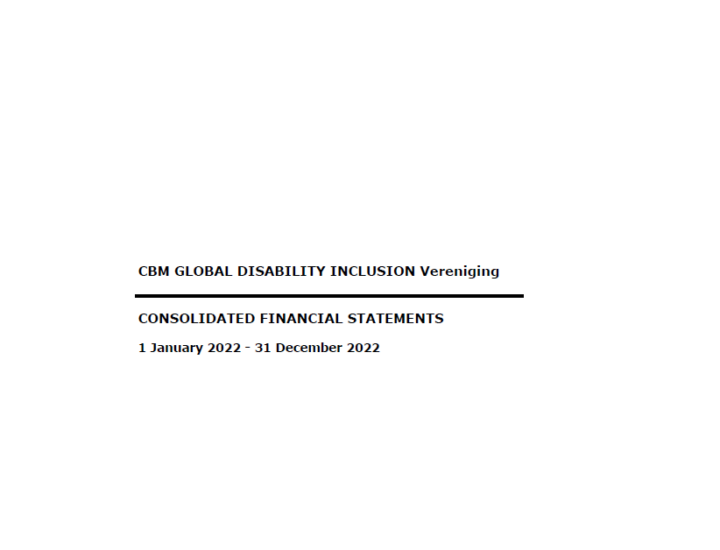Registered entities in the Netherlands and Germany
CBM Global Disability Inclusion Vereniging (CBM Global) is registered in the Netherlands under commercial registration number 75787032. The German subsidiary, CBM Global Disability Inclusion gGmbH is registered in the Handelsregister Darmstadt under number 100174.
Governance
The highest governance body of the Vereniging is the General Meeting of the Members. The General Meeting elects the Board of the Vereniging. The Board of CBM Global, under its Articles of Association and the Association’s By-laws, is allowed to have a minimum of 6 and a maximum of 9 members of which 3 members should be independent (non-Member) directors.
During 2022, CBM Global’s Board comprised nine members:
- Susanne Brandl – CBM Switzerland
- Raymond J. Coster – CBM New Zealand
- Mark Finan – CBM Ireland
- William Edwin M. Godfrey (Chair of the Board) – CBM UK
- Dulamsuren Jigjid – Independent
- Ivy Kihara – CBM Kenya
- Delphine Misan-Arenyeka (appointed May 2022) – Independent
- Michael R. Turnbull – CBM Australia
- Jose Viera – Independent
The board held virtual meetings every two months through the first half of 2022 and moved to quarterly meetings in the second half of the year, in light of the completion of transition related activities. An Audit, Risk & Finance (ARF) Committee convened to oversee financial and risk management and the whistleblower process. More information about CBM Global’s board members can be found on the website.
Executive Management
The Executive Director (ED) reported to the Board Chair. The ED, in addition to providing leadership and ownership of significant transition work packages, oversaw the delivery of a set of strategic priorities agreed with the board for 2022: promoting CBM Global as a unique and distinctive Federation; pursuing growth and new funding opportunities; developing a comprehensive partnership approach, building capacity and ensuring accountability with the Disability Movement; rolling out CBM Global’s programmatic strategy and commitment towards localisation; and consolidating operational systems and oversight.
Remuneration
All board members give of their time freely and no board members received remuneration in the year. The pay of CBM Global staff is reviewed annually and normally adjusted for increases in the retail price index. Salaries are also benchmarked against similar sized international non governmental organisations in the country in question.
Risk Management
The management team implemented a risk management process to manage and mitigate risks, including those related to transition. On a monthly basis, the Risk Register was reviewed and updated with the clear objective of diligently following through on all risk mitigation actions. The Board received reports for each of their board meetings.
Some of our Cash at Bank are held in local currency in our 11 country offices in Asia, Africa and Bolivia. To minimise Foreign Exchange risks, we only keep balances representing a few months of operating cost in the country offices and since the costs in these countries are also incurred in the local currency, we therefore mitigate our Foreign Exchange risk.
Safeguarding and Protection from Sexual Exploitation, Abuse and Harassment
CBM Global has policies on Safeguarding and Protection from Sexual Exploitation, Abuse and Harassment (SEAH) and related procedures to create an environment in which people, especially children, adults-at-risk and other programme participants are protected from any harm that may be caused because of their engagement with CBM Global’s programmes, operations, and people. CBM Global has a zero tolerance toward all forms of abuse and takes seriously any safeguarding concern or allegation involving CBM Global staff, representatives, and partners. CBM Global addresses safeguarding and PSEAH throughout its advocacy, advisory work, development and humanitarian field programming activities using the three-pronged approach of prevention, reporting and response.
A board appointed safeguarding lead worked with the Executive Director and Global Safeguarding Manager to review CBM Global’s safeguarding practices and manage all serious safeguarding incidents. Priorities for the year included risk assessment training and partner safeguarding assessments for country teams, setting up safeguarding committees and survivor services mapping to support referrals when responding to safeguarding incidents. Key achievements included enhanced training of the board and crisis management team, introducing resources to support safer recruitment practice and designing a 7 module internal safeguarding training portfolio to support our operations and programmes.
Financial results for the year
During the year income was € 23,612,393, with the largest portion being grants for direct projects with CBM Global partners (€ 16,072,886), with the remainder being mainly contributions of Members/CBM organisations towards the cost of CBM Global’s activities in support of project and advocacy activities. The significant increase in income and expenditure compared to 2021 is driven primarily by the fact that in 2022 we had a full year of project activity in the majority of our countries, whereas in 2021 we only managed a few months of project activity in light of the transition process.
Expenditures for the year amounted to € 22,777,374 of which € 14,825,714 were project grants to partners. In addition, we incurred a net foreign exchange loss of
€ 5,519.
The net result of the year was a surplus of income over expenditure of € 829,500 of which € 241,642 are earmarked for development projects. In line with the Reserves Policy agreed by the Board, the surplus for 2022 will be transferred to Reserves.
Outlook for the year 2023
The Board has approved utilisation of some of our Reserves to invest in various initiatives that will strengthen our organisation further for the years to come. Therefore we will be running some deficits as we utilise the Reserves to increase our impact.
CBM Global Financial Statement from 1 January 2022 – 31 December 2022

